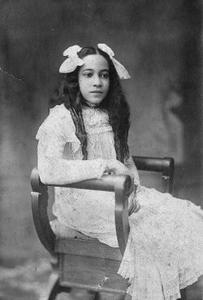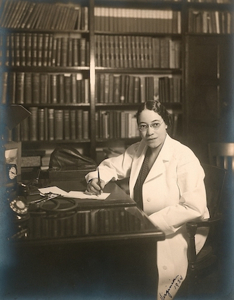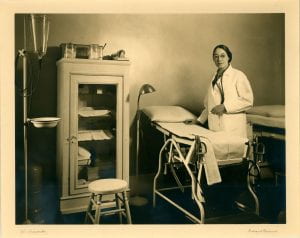Dr. Virginia Alexander
Author: Daniel.G
Dr. Virginia Margaret Alexander: A Pioneer in Medicine and Public Health
Virginia Margaret Alexander was born on February 4, 1899, in Philadelphia, Pennsylvania, to Hilliard Alexander and Virginia Pace, both of whom were born into slavery. She was the fourth of five children, and her siblings included prominent attorney Raymond Pace Alexander. Tragedy struck early in Virginia's life when her mother passed away when she was only four years old.

At age 13, Virginia faced another challenge when her father's riding academy closed. Initially, she withdrew from school to help alleviate the family's economic strain, but her father insisted that she complete her education. This early setback and her father's determination would shape Virginia's future commitment to education and service.
Virginia's academic journey was marked by perseverance and excellence. She attended the University of Pennsylvania on a scholarship, working various jobs to cover her living expenses. Her dedication paid off when she gained admission to the Woman's Medical College of Pennsylvania, where she excelled, ranking second highest among medical aptitude test examinees.

After graduating from medical school, Dr. Alexander completed her internship at Kansas City General Hospital, becoming the first woman physician in Missouri. She returned to Philadelphia in 1927 to start her medical practice, initially seeing outpatients in her home.
In 1931, Dr. Alexander founded the Aspiranto Health Home in her own house in North Philadelphia. This three-bed private hospital was primarily used for maternity care but also provided convalescent care and minor surgery. Aspiranto was more than just a medical facility; it was a teaching center for health education and birth control and a refuge from the pervasive racism in Philadelphia hospitals.
Dr. Alexander's approach at Aspiranto was revolutionary for its time. She called it a "socialized medical practice," emphasizing service to the community over profit. The health home provided care to the poorest members of the African American community, often free of charge. Services included general medical care, emergency treatment, and parenting classes.
Dr. Alexander's passion for public health led her to pursue further education. In 1937, she earned a master's degree in public health from Yale University, becoming one of the first people to acquire such a degree. This achievement was particularly notable as she became the first African American woman to receive a degree from Yale's School of Medicine.

Following her studies at Yale, Dr. Alexander accepted a position at Howard University in Washington, D.C., where she served as the physician-in-charge of women students. She also maintained a private health practice and worked for the U.S. Department of Health.
During World War II, Dr. Alexander volunteered for the government and was sent to Birmingham, Alabama, to treat coal and iron miners living in extreme poverty. She worked with the U.S. Public Health Service from 1943 to 1945 at the Slossfield Clinic in Birmingham.
Throughout her career, Dr. Alexander conducted groundbreaking research on health disparities. In 1935, she authored "The Social, Economic, and Health Problems of North Philadelphia Negroes and Their Relationship to a Proposed Interracial Public Health Demonstration Center," which exposed significant health disparities between Black and white residents in Philadelphia.

Her other notable publications included:
-
"Negro Hospitalization" (1937)
-
"The Health Status and Needs of the Negro Adolescent" (1940)
-
"The Health Status of Negro Workers in the National Youth Administration in the District of Columbia" (1941)
Dr. Alexander was a vocal advocate for health equity and fought tirelessly against racial discrimination in healthcare. She supported the 1939 National Health Bill, an early attempt at establishing a national health insurance system.
While Dr. Alexander was not directly involved in the founding of Mercy-Douglass Hospital, her work was part of the broader context of African American healthcare in Philadelphia during this era. Mercy-Douglass Hospital was formed in 1948 through the merger of Mercy Hospital and Frederick Douglass Memorial Hospital.
Both Mercy and Douglass hospitals, like Dr. Alexander's Aspiranto Health Home, were established to provide medical care and training opportunities for African Americans who faced discrimination in other healthcare settings. The merger of these hospitals was motivated by financial strains during the Great Depression and the need for more effective, accessible, and quality community health care.
Although Dr. Alexander passed away before the merger, her colleague Dr. Helen Octavia Dickens, who worked with her at Aspiranto, went on to become the director of the Department of Obstetrics and Gynecology at Mercy-Douglass Hospital in 1948. This connection illustrates how Dr. Alexander's work and mentorship influenced the broader landscape of African American healthcare in Philadelphia.
Dr. Alexander never married or had children, but she reportedly had a relationship with W.E.B. DuBois, the prominent intellectual and editor of "The Crisis". She lived with her father in North Philadelphia for most of her life.
Tragically, Dr. Alexander's life was cut short by lupus, an autoimmune disease she developed while working in Alabama. She passed away on July 24, 1949, at the age of 50, in her native Philadelphia.
Dr. Virginia Margaret Alexander's legacy lives on through the countless lives she touched as a physician, researcher, and advocate. She was known as the "guardian of the health of Negro women" for her work with Black mothers and newborns. Her pioneering efforts in community health, research on racial disparities in healthcare, and commitment to serving the underserved continue to inspire medical professionals and public health advocates today.





 on the uploaded document.
on the uploaded document.
0 General Document comments
0 Sentence and Paragraph comments
0 Image and Video comments
General Document Comments 0

